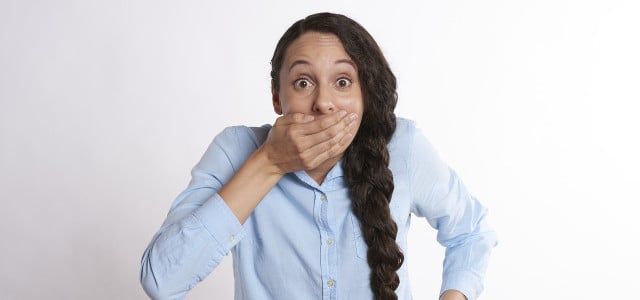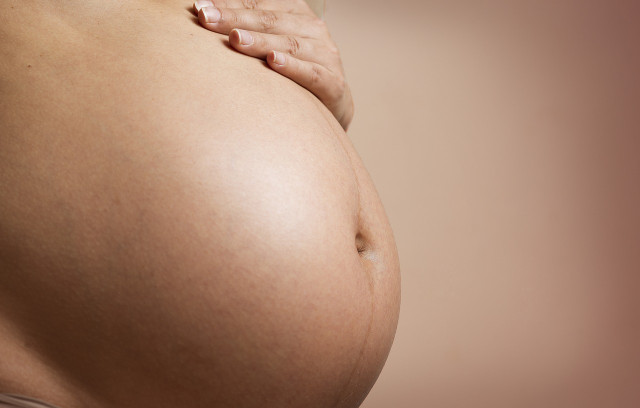
Hiccups are usually harmless and go away after a few minutes. Nonetheless, it can be very annoying. Here you can find out what causes the hiccups and what helps against them.
A hiccup occurs when the main muscle of breathing, the diaphragm, spasms. The diaphragm is dome-shaped and separates the abdomen and chest from each other. When you breathe in, the diaphragm contracts, lowers, and expands the chest cavity above it, allowing air to flow into the lungs.
When the muscle spasms, the glottis in the larynx closes suddenly and prevents too much air from flowing in at once. The air that has already been inhaled hits the closed vocal folds: this leads to the well-known hiccup sound.
Everyone has the hiccups

(Photo: CC0 / Pixabay / Fotorech)
It’s not entirely clear what hiccups are good for. It is a fact that even babies in the womb have hiccups. This is probably to train the breathing reflex and prevent the child from breathing in the amniotic fluid.
Why hiccups also occur in adults is unclear. Closing the glottis is probably intended to prevent air from entering the esophagus or too much air from entering the lungs at once.
Causes of hiccups
When the diaphragm spasms, there is usually irritation of the phrenic nerve, called the phrenic nerve. This can be triggered by various factors:
-
Eating too fast: When you eat too quickly, your stomach expands. This can irritate the diaphragm muscle and cause hiccups.
-
Food that is too hot or too cold: Extreme temperatures in the stomach can also irritate the nerve.
-
Drinking: Fizzy drinks or alcohol also cause stomach distension and can trigger hiccups.
-
Swallowing air: If air gets into the stomach, it expands. This can also lead to cramping of the diaphragm.
-
During pregnancy: Since the baby often presses on the diaphragm during pregnancy, pregnant women are also affected more frequently.
-
Psychological factors: Psychological stress such as fear, haste or fright is usually accompanied by irregular breathing. The diaphragm spasms and we get hiccups.
What helps against hiccups?

(Photo: CC0 / Pixabay / StockSnap)
In order for the hiccups to calm down, the diaphragm must relax again. There are various methods and tricks that can help with this. Everyone has to find a suitable one for themselves.
-
Hold your breath: Breathe in as much air as possible at once and then hold your breath for about 30 seconds. Then, as you let the air out, the diaphragm relaxes and stretches.
-
Startle: A common strategy to stop hiccups is to startle the sufferer. When startled, we breathe in sharply and the diaphragm contracts. This often relieves the cramping. The hiccup will probably not say thank you in particular for this help.
-
Drinking water: Sipping water is often described as a helpful method. Dry swallowing or drinking upside down should also be helpful. This creates a distraction for the stomach and respiratory system, which often stops the hiccups.
-
Distraction: Another method of distraction is to get the hiccups thinking with a difficult question. In this way, the brain is distracted from the diaphragm spasm and the muscle can calm down.
-
Laughing: When we laugh, the diaphragm is very active and gets relaxed. At the same time, we are distracted by the hiccups.
-
Massaging the diaphragm: The diaphragm lies horizontally under your abdominal wall. It is therefore difficult to achieve. But it starts at the lower costal arches and you can feel and massage it there. A warm abdominal wrap can also help to relax the muscle.
-
Eye massage: A massage of the eyes on the closed eyelids should slow down the pulse and calm and relax breathing.
These and other tricks all serve to relax the respiratory muscles. It can therefore also be helpful to simply continue to breathe calmly and evenly. This exercise can help with that:
- Lie on your back on the floor, pull your legs up and press your hands into the floor. This is intended to further relax the diaphragm muscle. Now breathe out and in slowly until the hiccups stop.
Help from the doctor: Acute or chronic hiccups?

(Photo: CC0 / Pixabay / DarkoStojanovic)
Hiccups are usually harmless and stop after a few minutes. This is called acute hiccups. But if it doesn’t stop or keeps coming back, it’s called chronic hiccups. So if the hiccups still haven’t stopped after 48 hours, you should see a doctor.
If other symptoms occur in addition to the hiccups, it is also advisable to consult a doctor. In rare cases, the spasm of the diaphragm can also have other causes.
Caution: If symptoms such as impaired vision and/or speech, paralysis, severe headaches, dizziness or nausea occur with hiccups, then it could be a stroke or other neurological problem. Action should be taken immediately and the emergency number called 112.
Read more on Techzle\.com:
- Taking a cold shower: it’s so good for your health
- Breathing exercises: You should know these exercises
- Healthy feet: tips for natural care
Revised by Lena Kirchner